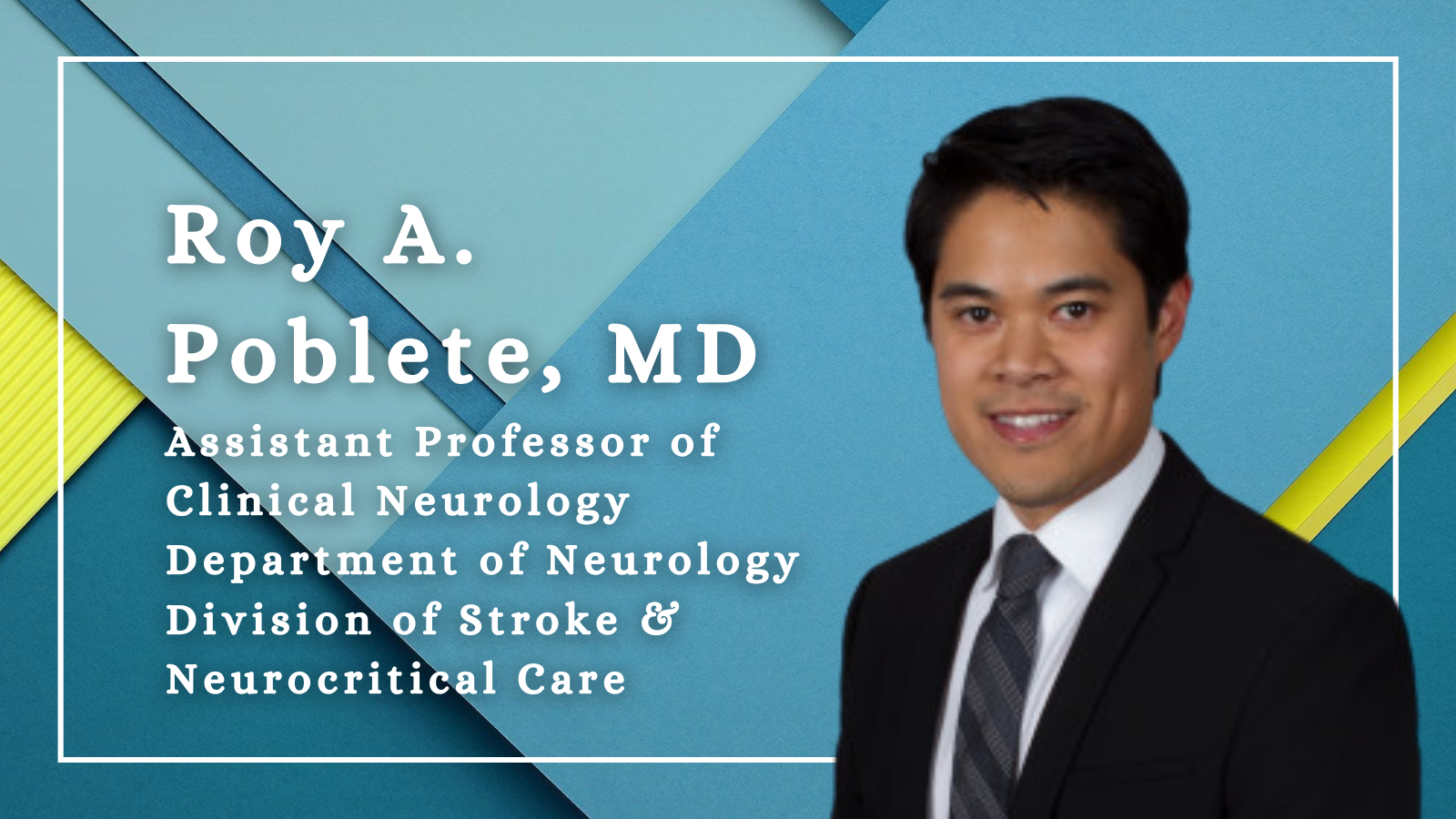SC CTSI KL2 Scholar receives prestigious junior editor role with the Journal of Clinical and Translational Science

We sat down (virtually!) with Dr. Roy Poblete, a recipient of the SC CTSI Mentored Career Development in Clinical and Translational Science and recipient of multiple SC CTSI funding awards. We hear from him about his new role as junior editor with the Journal of Clinical and Translational Science (JCTS), the official journal of the Association for Clinical and Translational Science, and the Clinical Research Forum. Congratulations to Dr. Poblete on this great accomplishment!
1. What is your role at USC?
My current position is Assistant Professor of Clinical Neurology within the Department of Neurology, Division of Stroke & Neurocritical Care of the Keck School of Medicine.
My training is as a neurocritical care physician. My primary site of clinical practice is the LA County + USC Medical Center, a large county safety net hospital and Level I trauma center. There, I lead the neuroscience ICU in managing patients with stroke, intracerebral hemorrhage, seizures, traumatic brain injury and other life-threatening conditions of the central nervous system.
I am a translational researcher and a scholar in the SC CTSI Mentored Career Development in Clinical and Translational Science (MCD-CTS) program (formerly the KL2 program). I serve as site co-investigator for several multicentered clinical trials in stroke and neurocritical care.
2. What is your affiliation to SC CTSI (i.e. how has SC CTSI helped you in your career journey, training, funding, etc)?
The SC CTSI has been invaluable in my development as a translational, early career investigator. From early in my appointment, I attended several workshops and seminars supported by the SC CTSI, including those related to career development, study design, biostatistics, and REDCap database management. After completion of the SC CTSI Introduction to Clinical and Translational Research (ICTR) 10-week course, I received a pilot grant in 2019 to study the pharmacokinetics of a novel drug therapy in subarachnoid hemorrhage. I have also received an SC CTSI Team Building Award in 2019, which allowed a multidisciplinary group of investigators led by Darrin Lee, MD, PhD to establish a cerebrospinal fluid flow disorders research group.
I was accepted in the MCD-CTS program in 2020. The program has supported my career development by providing salary support, research time, and core curriculum to refine my research skills towards becoming an independent clinician-scientist.
3. What year are you in the KL2 program and what have you been focusing on thus far? Who is your mentor?
I am currently in the second year of the three-year program. My current research is focused in the field of traumatic brain injury (TBI). During the program, I am investigating the potential mechanistic and clinical role that specialized pro-resolving lipid mediators of inflammation (SPMs) play in TBI pathogenesis and recovery. In my research, I am studying the utility of SPMs as a biomarker of disease in a human cohort, while also investigating the effect of SPM administration in a rodent model of TBI.
My mentor for this project is Dr. Stan Louie, PharmD, PhD from the USC School of Pharmacy. He is an expert in drug discovery, metabolic profiling, and translational research. He currently serves as the Director of the Pharmacoanalytical laboratory at USC. My mentoring team also includes Dr. Nerses Sanossian, MD and biostatistician Dr. Steven Cen, PhD, both from the Department of Neurology.
4. What does the nomination for junior editor at JCTS mean to you? How do you hope it will impact your career?
My short-term goal as an early career mentored researcher is to pursue meaningful training opportunities that will prepare me to become an independently funded principal investigator of pre-clinical and clinical research. Being a junior editor for the prestigious JCTS is an exciting way to refine skills as a scientist, author, and reviewer. Additionally, as a team member, I hope that this nomination will lead to future opportunities for mentorship and to collaborate with other experts in translational research.
5. What do you hope to accomplish during your tenure as junior editor?
My goal during my two-year tenure as junior editor is to uphold the core aims of JCTS to disseminate high-quality translational research centered on important clinical problems. There is a training and educational component to this position as well, and I will use the opportunity to build skills that can be used for future positions as editor of a medical or translational research journal.
6. What are you looking forward to the most in the context of this role?
I am most looking forward to the opportunity to be mentored from experienced editors and translational researchers in this role. I am excited to work as a team to make the process of manuscript review and scientific dissemination as smooth and successful as possible, and to support the mission of JCTS through other responsibilities as junior editor.



